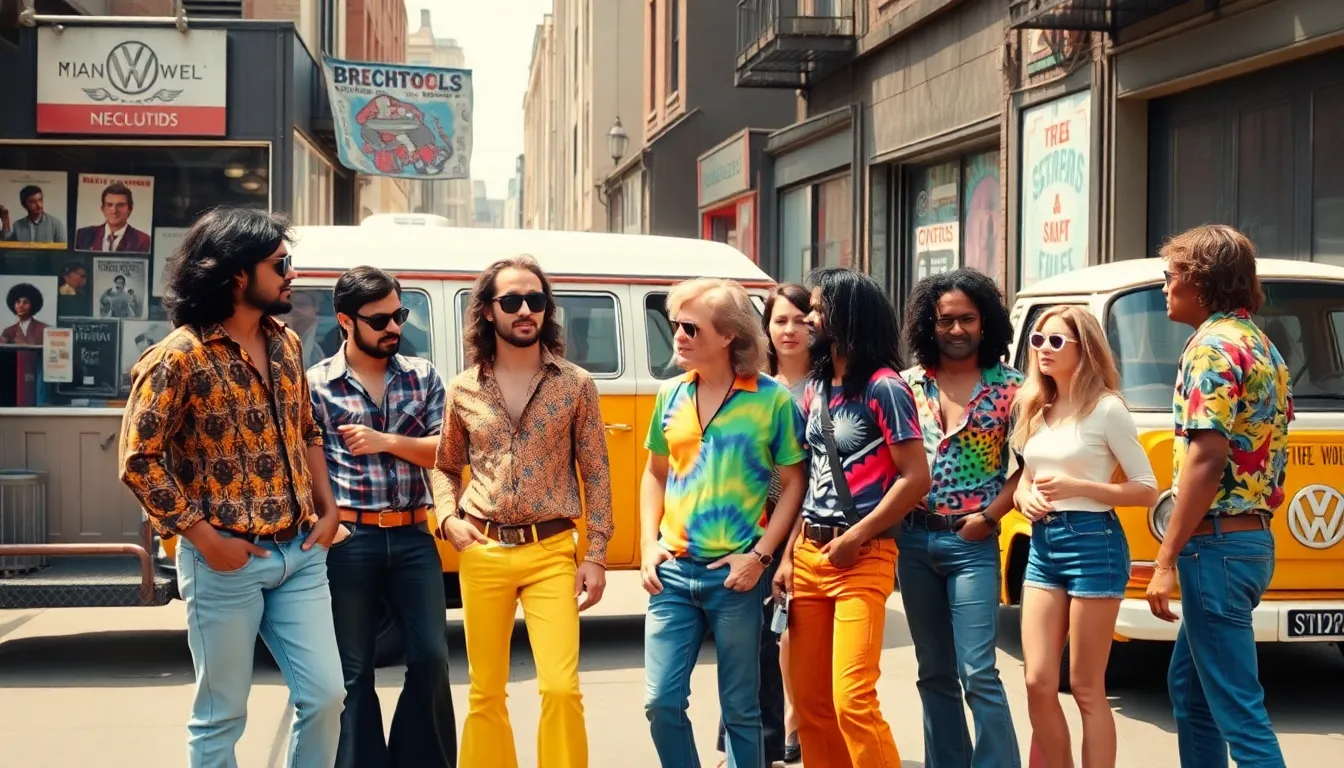Table of Contents
ToggleAh, the 1970s, a decade that brought us bell-bottoms, funky music, and a cultural revolution. You might think of disco balls glimmering under strobe lights or punk rockers shouting rebellion from the stage. But wait. As fun as it is to reminisce about dancing to the Bee Gees and cringing at horrible hairstyles, the 1970s was far more than just a party. It was an influential era that shaped modern entertainment, style, and societal norms. Buckle up: we’re about to dive deep into the vibrant tapestry of pop culture that made the ’70s unforgettable.
Defining The Era: Key Characteristics

The 1970s was a time of shifting paradigms, characterized by a cultural and social consciousness that broke from the more repressive conventions of the previous decades. The end of the tumultuous 1960s spurred a transformation, resulting in diverse artistic expressions and social movements. From the rise of individualism to the emergence of various subcultures, the 1970s fostered an arena where every voice mattered.
Also, this era was marked by a distinct sense of disillusionment. The Watergate scandal, the Vietnam War, and economic downturns triggered a wave of skepticism towards authority. Yet, amidst this chaos, creativity flourished. From music to film to fashion, the decade was a hotbed for artistic innovation, capturing the spirit of a generation unafraid to challenge norms.
Music Trends: From Disco To Punk
When talking about the ’70s, one can’t overlook the musical landscape that evolved dramatically. Disco became a defining genre, characterized by its upbeat tempo and feverish dance beats, think Saturday Night Fever. Clubs filled with vibrant lights became sanctuaries for groovers who just couldn’t get enough of those catchy hooks. Artists like Donna Summer and the Bee Gees ruled the airwaves, encouraging everyone, from the dance floor kings to the unsuspecting spectators, to move to the rhythm.
But, lurking in the corners of this glitz and glam was the raw energy of punk rock. Bands like The Ramones and The Sex Pistols epitomized rebellion with hard-hitting music and a do-it-yourself attitude. Punk was not just a genre: it was a vehement outcry against the mainstream and a call for authenticity. This vibrant contrast between disco and punk illustrates the dynamic nature of the decade, catering to diverse tastes and attitudes.
Television Revolution: New Genres And Icons
The television scene in the 1970s resembled a revolution in programming, giving birth to unforgettable shows and characters. Iconic sitcoms like All in the Family explored tough societal issues wrapped in humor, effectively addressing race, gender roles, and class disparity. It was groundbreaking to see such real-life dilemmas depicted alongside laughter, making audiences think while they enjoyed their evening entertainment.
Meanwhile, crime dramas and thrillers blossomed, with shows like Columbo and Starsky & Hutch. Tales of gritty realism captivated viewers, pulling them into a world where justice was delivered with wit and suspense. Also, the advent of miniseries, such as Roots, showcased a new storytelling format that created a rich tapestry of narratives impacting public consciousness.
Film Highlights: Blockbusters And Cult Classics
The film industry experienced a transformative period during the 1970s, leading to the rise of the blockbuster. With Jaws hitting theaters in 1975, audiences became accustomed to large-scale cinematic experiences. This movie, often credited as the first modern blockbuster, set the stage for a new era where bigger was indeed better.
But it wasn’t just about the blockbusters. Cult classics began to carve out their place, appealing to niche audiences and showcasing unique storytelling. Films like The Rocky Horror Picture Show and A Clockwork Orange found their way into the hearts of fans, blending avant-garde narrative with daring visual style. Not only did these films entertain, but they also encouraged viewers to think outside the box and explore unconventional ideas.
Fashion Statements: Trends That Defined The Decade
Fashion in the 1970s was as eclectic as the music of the time. The decade embraced bold colors, flamboyant patterns, and experimental silhouettes. Bell-bottomed jeans and maxi dresses dominated street style, while the rise of platform shoes had everyone walking a little taller, literally. The glam rock movement introduced sequins and outrageous outfits, courtesy of icons like David Bowie, who broke barriers and norms in the fashion world.
And let’s not forget the influence of punk. It brought an entirely new aesthetic characterized by leather jackets, ripped clothing, and a rebellious attitude. It was about expressing individuality and rejecting mainstream trends, emphasizing that style could carry a message just as powerful as music.
Social Movements And Their Impact On Culture
The 1970s was a significant time for social movements that challenged the status quo and reshaped societal norms. The feminist movement gained momentum, advocating for gender equality and women’s rights, influencing everything from workplace policies to pop culture narratives. This push for equality seeped into entertainment as more female voices emerged in film and music.
Also, the civil rights movement continued its momentum, addressing ongoing racial injustices. Artists and activists alike used their platforms to spread awareness and inspire change. The effects of these movements are still felt today, reminding society that cultural shifts can lead to meaningful progress. The decade served as a fertile ground for awareness and activism.
Legacy Of The 1970s Pop Culture
The lasting impact of 1970s pop culture is undeniable. It set the stage for future generations, influencing music genres, television formats, and fashion sensibilities for decades to come. The fusion of various styles and sounds continued to evolve, birthed by the eclectic expressions of artists in the ’70s.
Also, the social awareness ignited by the movements of this decade remains relevant. Today’s pop culture still reflects the societal issues and voices championed in the past. The vibrant spirit of the ’70s, a blend of joy, rebellion, and transformation, has left a permanent mark on the cultural landscape.




